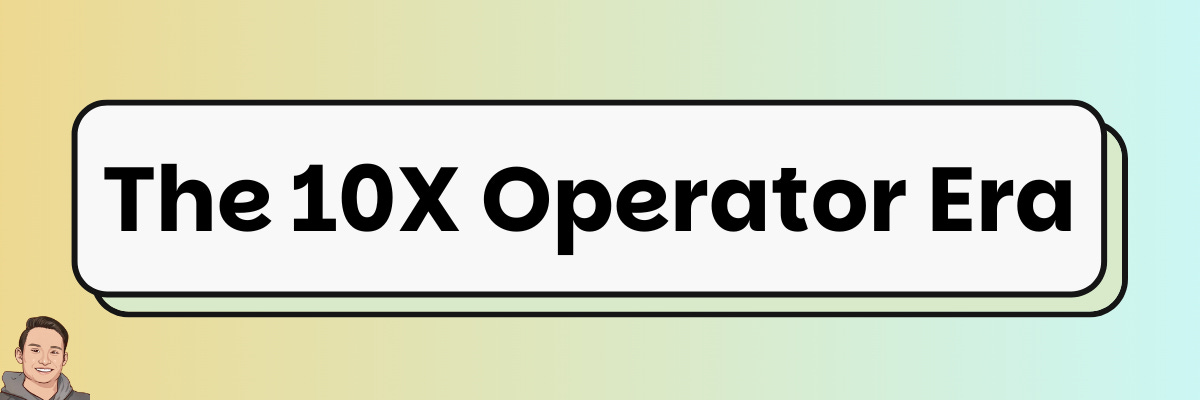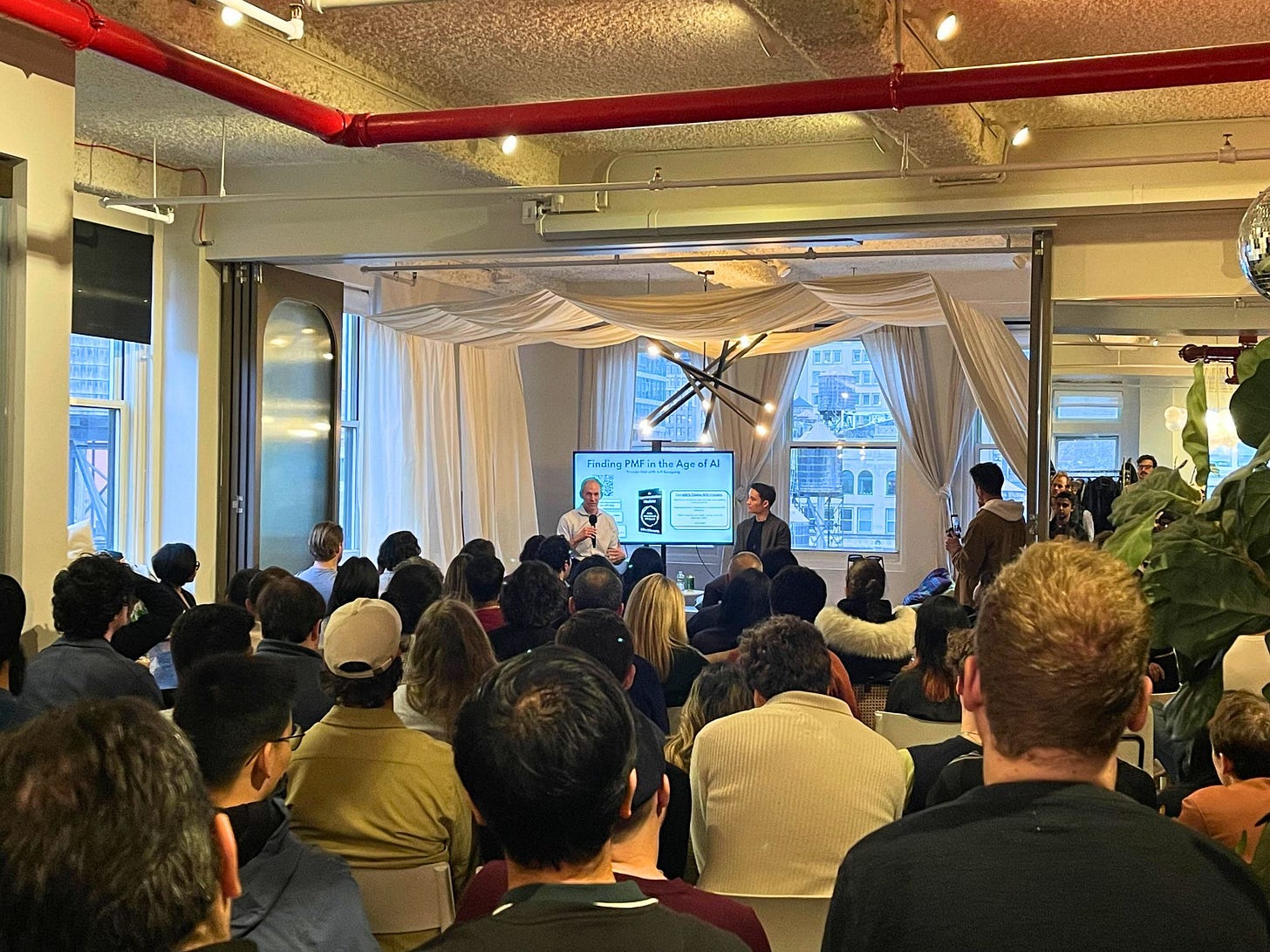The 10X Operator Era
Key takeaways from my conversation with a Harvard lecturer, investor, and exited founder.
Welcome to the 4,374 new subscribers who have joined our community of 48,378 readers since the last issue! If you haven’t subscribed, join us below:
Today’s issue is brought to you by our sponsor, Above Ground Coffee – The #1 Curated Coffee Subscription.
Each month, we hand-select and deliver a unique, premium coffee to your door—fresh, flavorful, and roasted to perfection. Discover the rich stories and origins behind every brew. New subscribers enjoy 50% off their first bag as a warm welcome to our coffee-loving community. Just use code: AY at checkout!
It’s more than coffee—it’s a journey in every cup.
Knowledge work is about to look completely different.
My definition of knowledge work: If you primarily use a computer to get your job done, you’re a knowledge worker.
In the next 12 months, we’re going to throw out the entire playbook on what it means to be a “high performer.”
Before I founded my company, Fibe, I worked at Google, Meta, and Bell, so I’ve seen what high performance looks like inside the world’s biggest, most competitive tech orgs.
Now, I’m on the other side.
I meet with 100+ founders every month. People who are attempting to build the future right now.
And everything I’m seeing tells me this: The way we work, design, and communicate is about to shift dramatically.
Last week, I talked to Jeff Bussgang, Senior Lecturer at Harvard Business School and Co-founder of Flybridge, a $1B venture fund.
He believes that AI will fundamentally reshape knowledge work.
But first, a bit about Jeff:
Started and sold a company for $300M
Founded and runs a $1B venture capital firm
Teaches at Harvard and has written multiple books on AI and investing
When someone like that talks, you listen!
Here are my six key takeaways from my conversation with Jeff:
The Rise of the 10X Operator:
In the next 12 months, we’ll finally see what it really means to be a 10X Operator.
They’ll build faster, get promoted sooner, and get access to opportunities that no one else even sees. It won’t be because they’re 10X at everything, but because they’re 100X at a few things.
For example:
A designer spinning out hundreds of mockups in a week
An analyst running deep dives in parallel, not in sequence
A product manager shipping dozens of experiments in days, not quarters
You’ll watch them and wonder: "How are they making it look so easy?
Jeff recently invested in a startup with just six employees, supported by 2,000 AI agents. Each employee manages hundreds!
The 10X Operator will be someone who treats AI tools as extensions of their own capabilities. They’ll habitually use AI copilots and agents to enhance productivity, creativity, and decision-making, and their first instinct for any challenge will be to leverage AI.
Being “full stack” will no longer imply you know how to code, but that you know how to command an army of AI workflows.
The Best Programming Language Is Now English:
If you speak English, you can build. Being “non-technical” is no longer an excuse:
You don’t need to spend months finding a CTO.
You don’t need to drop $30K on a dev shop.
You don’t need to learn to code.
You just need to describe what you want… in plain English.
Thanks to AI, you can now go from Idea → MVP in a single day.
Naval Ravikant once said:
“Learn to sell. Learn to build. If you can do both, you will be unstoppable.”
Well, now anyone can learn to build.
AI is doing for software what Canva did for design and Shopify did for eComm.
We’ve entered the era of software fluency without syntax.
Skills > Credentials:
In today’s world, credentials > competence.
Harvard, Stanford, and Princeton open more doors than the ability to actually do the job.
GPA still matters more than grit. The default playbook for breaking into a new industry is to get an MBA. And "blue-chip” company names on your resume are what get people interested.
I know this firsthand. I’ve interviewed at some of the world’s most prestigious companies. And in many rooms, brand still beats skill.
But AI is about to flip that on its head.
In the future, skills and capabilities will matter more than the logos on your résumé.
We’ll finally be able to evaluate people based on what they can do, not where they came from.
Job interviews won’t just be about what you know. They’ll ask you about the AI agents you use, the workflows you’ve built, and the systems you run.
The Most Important Skills:
In an AI-first economy, the most important skills to have will be taste, judgment, and decision-making.
As AI agents take over more executional work, the role of the human shifts. You’re no longer the individual contributor, but instead the orchestrator, managing hundreds (or even thousands) of AI agents to bring ideas to life.
Taste → Knowing what great looks like.
Judgment → Evaluating AI outputs with nuance.
Decision-making → Choosing the right tools, workflows, and strategies to execute effectively.
But AI doesn’t understand cultural context, intuitive design, or the small emotional cues that build trust. That’s where humans come in.
In a world that will inevitably be overflowing with content, products, and data, the ability to curate and sift through the noise will be invaluable.
How to Not Get Left Behind:
Inevitably, people will get left behind. These are the laggards—the ones who resist new tools, dismiss AI as hype, or refuse to evolve how they work.
Two profiles stand out:
The Static Specialist is the individual who is highly skilled in one domain but resistant to learning adjacent tools or tech (especially AI). Unfortunately, in a world where AI can do 80% of the “standard work,” specialists who don't layer AI on top of their craft risk being replaced or deprioritized.
The Complacent Performer is the person who thinks their job is safe because they were previously high-performing. But past success doesn’t guarantee future relevance. The bar is shifting—from what you know, to how fast you learn and how well you adapt.
Charlie Munger once said:
“All I want to know is where I'm going to die so I’ll never go there.”
These profiles are where careers go to die. Avoid them at all costs.
Preparing For Tomorrow:
So, how can you prepare for tomorrow?
Use AI tools day-to-day. Not just ChatGPT, but tools like Perplexity, Lindy, Midjourney, and Lovable too. Know which tool is best for what job, and master it. Be a habitual AI user.
Learn to quickly automate boring work. Instead of spending hours writing reports, summarizing notes, or rewriting emails, outsource your work to AI. Make a habit of identifying what is a bad use of your time, before moving on to higher-leverage activities.
Become an experimentation machine. Don’t ask for permission to test something, but instead approach everything with an experimental mindset. See if you can do things with fewer clicks and less time.
Lastly, I believe that everyone reading this should invest at least 10–20 hours into learning how to leverage AI at work. The ROI is insanely high, and there’s virtually no downside to leveling up your skills.
I’ve found a ton of value in taking Maven courses, and they have been kind enough to offer $100 off to all my readers.
Here are a few standout courses you can take:
AI Builders: Mastering AI Through Hands-On Projects and Frontier Insights
AI-Supercharged Storytelling & Data Analysis for Leaders and Managers
📌 Further Resources
📚 Buy Jeff’s book: To purchase Jeff’s new book The Experimentation Machine, you can buy it here.
📺 Watch the lectures: See Jeff's video interview here for a similar presentation.
🤝 Meet other builders: Join 700+ other founders, entrepreneurs, and builders at my event, The OOO Summit, on May 16! Save your spot here.
💼 Job Board
Sharing job opportunities that my friends are hiring for. If we know each other, feel free to reach out, and I can connect you directly.
Senior Full-Stack Software Developer, Neo.Tax
Founding Engineer, Stealth AI Prosumer Startup
Startup Community Manager, Intercom (mssg John Roche)
Head of Engineering, Carry
Founding Growth Lead, Superpower
Marketing Manager / Sr Product Designer, Escargot
Sales Manager, Reddit
Senior Product Manager, Sydecar
Software Engineer, Atlas
Multiple roles, Othership
Have a job to share? Let me know by replying to this email.
👉 Btw, if you want to be part of our partner talent network, next play, and get curated job opportunities in your inbox, please sign up here.
💃 Community Perks
🍽️ Love dining out? Get up to 30% off your bill at top restaurants with InKind.
It’s the ultimate dining app for foodies—earn up to 30% back when you eat out, plus get $50 off your bill every month at select spots. And as a bonus, we both get $25 free when you sign up. Sign up here.
💳 Sign up for the AMEX Platinum and earn 80K points when you spend $8K in 6 months. Sign up here.
🇺🇸 Looking for a US immigration lawyer? Reply here for an introduction to the lawyers I recommend for O1A/EB1 visas.
🚴 Discounted Equinox membership in NYC. Reply here for a free trial and discounted membership.
What other perks should I include? Let me know..
🖼️ Behind the Scenes
If you’ve been to one of our events, chances are you’ve met Jacob Solano, my Chief of Staff. He’s the reason our events run on time, our partners stay happy, and we’re able to host over 100 events a year without hiccups. Jacob has been our secret weapon for events and the community.
So today, I’m thrilled to share that Jacob is stepping into a new role as our Head of Partnerships and Community.
I’m incredibly grateful for his work, energy, and passion. None of this would have been possible without him! Congrats Jacob!









Hello Andrew,
I hope this communique finds you in a moment of stillness. Have huge respect for your work.
We’ve just opened the first door of something we’ve been quietly crafting for years—
A work not meant for markets, but for reflection and memory.
Not designed to perform, but to endure.
It’s called The Silent Treasury.
A place where judgment is kept like firewood: dry, sacred, and meant for long winters.
Where trust, patience, and self-stewardship are treated as capital—more rare, perhaps, than liquidity itself.
This first piece speaks to a quiet truth we’ve long sat with:
Why many modern PE, VC, Hedge, Alt funds, SPAC, and rollups fracture before they truly root.
And what it means to build something meant to be left, not merely exited.
It’s not short. Or viral. But it’s built to last.
And if it speaks to something you’ve always known but rarely seen expressed,
then perhaps this work belongs in your world.
The publication link is enclosed, should you wish to open it.
https://helloin.substack.com/p/built-to-be-left?r=5i8pez
Warmly,
The Silent Treasury
A vault where wisdom echoes in stillness, and eternity breathes.